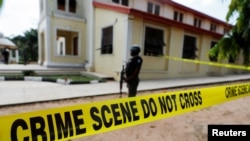Abuja-based security risk management and intelligence analyst Kabir Adamu says there has been a history of violent attacks by organized armed groups in Owo but said this is the first such ''horrific'' attack on a religious group in Nigeria's southwest region.
At least 50 people were killed when unknown gunmen attacked the church in the Ondo state capital of Owo on Sunday. No group has claimed responsibility and the federal government has not released any information on possible perpetrators.
The analyst says the development speaks volumes of weak security arrangements in rural areas.
''Targeted attacks involving armed gunmen (are) unfortunately quite common in several parts of Nigeria's southwest specifically in Ondo state," he told VOA. "There have been recorded instances where gunmen have attacked especially financial institutions, and prisons."
''With the information that unexploded devices were found at the scene of the crime on Monday, it appears the intention was even more sinister than what actually occurred'', Adamu remarked.
He adds that ''the fact that a certain group moved from wherever they moved from, went to that church (and) carried out the attack and escaped almost freely is very worrisome.''
Speaking generally, Adamu cited unemployment, climate change effects, proliferation of small arms and light weapons, along with unresolved socio-economic grievances, as key drivers of violent attacks on Nigerians.
New York-based Soufan Center Executive Director Naureen Chowdhury Fink told VOA that ''with no claim of responsibility, it is difficult to know if the attack is part of a pattern.'
''For several years we have seen that “soft targets” like places of worship, restaurants, (and) transportation are appealing targets for terrorist groups but without any declared motive or claim it remains unclear whether this was a particularly chosen target or part of a broader campaign of violence'', she says.
She notes that ''Nigeria already confronts a complex mix of challenges that include violence perpetrated by terrorist groups and other actors, but it cannot be presumed that this attack, horrific as it is, in itself represents a spread of violence.''
Fink urges Abuja to make ''every effort'' to ''find perpetrators'' and hold them to account with ''respect to the rule of law."
''Demonstrating that there is no impunity for such violence is one of the strongest messages the state can send to show that it is capable and willing to protect its citizens.''








